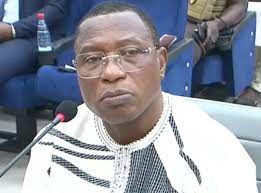In Guinea, the 28 September 2009 massacre trial is drawing to a close.
After 20 months of hearings and pleadings at the Dixinn criminal court, Prosecutor Alghassimou Diallo has requested life imprisonment for the former head of the junta in 2009, Moussa Dadis Camara, and several other leaders of the military regime described by many observers as a dictatorship.
The prosecution asked the court to impose a 30-year prison sentence and to reclassify the offences as crimes against humanity involving murder, assassination, torture, kidnapping and rape.
Taking the view that Guinea “is a family” and that “no Guinean is superior to another,” the representatives of the public prosecutor’s office indicated that the former transitional president deserved such a sentence for having “done nothing to ensure that this meeting was not suppressed” at Conakry stadium. “On the contrary, he planned it,” noted Elhadj Sidiki Camara, another representative of the public prosecutor’s office.
At least 156 people were shot dead or killed with knives, machetes or bayonets, and hundreds injured in the crackdown on this opposition rally calling for an end to military rule and the organisation of presidential elections, according to a report by an international commission of enquiry commissioned by the United Nations. The report also notes that no fewer than 109 women were raped during the crackdown.
In its indictment of these massacres, the public prosecutor pointed to the responsibilities of Moussa Tiegboro Camara, former head of the fight against drug trafficking, Abdoulaye Cherif Diaby, former Minister of Health, Marcel Guilavogui, who was close to Dadis Camara at the time, Blaise Goumou, a gendarme who was a member of the anti-drug unit, and Claude Pivi, former Minister of Presidential Security, who is currently on the run. In his view, all these dignitaries of the former regime of the Guinean dictator should be sentenced to life imprisonment.
On the other hand, the public prosecutor requested a sentence of fifteen years’ imprisonment for the military officers Ibrahima Camara and Paul Mansa Guilavogui. He asked for the same sentence for Aboubakar Diakite, known as Toumba, Moussa Dadis Camara’s aide-de-camp in 2009, who became the darling of social media in the sub-region.
His repartee and his line of defence sometimes leave many people watching the trial on television hilarious.
Although Toumba agreed to tell the court “his part of the truth,” the lawyers for the civil parties insisted on the role he played in the 28 September massacre. In their view, the former aide-de-camp went to the stadium to take part in the repression on that unforgettable day for many of the victims’ families.
ODL/ac/fss/as/APA


